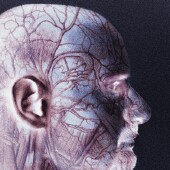Music Therapy Improves Stroke Outcomes
Study finds enhanced alertness, mood in those who listened just a few hours a day.
|
E-mail this article
Subscribe to news
Printer friendly version
|

(SOURCE: Brain, news release, Feb. 19, 2008)
WEDNESDAY, Feb. 20 (HealthDay News) -- Listening to music for a few hours a day can help boost a stroke patient's early recovery, according to Finnish researchers.
Their study of 54 patients who'd suffered a stroke of the right or left hemisphere middle cerebral artery found that those who listened to music for a few hours a day showed better improvements in verbal memory and focused attention, and had a more positive mood than those who listened to audio books or listened to nothing at all.
The study, published in the Feb. 20 issue of Brain, is the first to show this link between music listening and stroke recovery, and the findings may prove useful in clinical practice, the researchers said.
"As a result of our findings, we suggest that everyday music listening during early stroke recovery offers a valuable addition to patient's care -- especially if other active forms of rehabilitation are not yet feasible at this stage -- by providing an individually targeted, easy-to-conduct and inexpensive means to facilitate cognitive and emotional recovery," study first author Teppo Sarkamo, of the University of Helsinki and the Helsinki Brain Institute, said in a prepared statement.
The two-month period of music therapy began as soon as possible after the stroke patients were admitted to hospital. The patients, who made their own music selections, were followed and assessed up to six months after the stroke.
"We found that three months after the stroke, verbal memory improved from the first week post-stroke by 60 percent in music listeners, by 18 percent in audio book listeners and by 29 percent in non-listeners," Sarkamo said. "Similarly, focused attention -- the ability to control and perform mental operations and resolve conflicts among responses -- improved by 17 percent in music listeners, but no improvement was observed in audio book listeners and non-listeners. These differences were still essentially the same six months after the stroke."
Patients in the music listening group were less depressed and confused than non-listeners.
The researchers said three neural mechanisms may be involved in how music helps stroke patients' recovery:
- Enhanced alertness, attention and mood, mediated by a part of the nervous system (the dopaminergic mesocorticolimbic system) that plays a role in pleasure, reward, arousal, motivation and memory.
- Direct stimulation of the recovery of damaged areas of the brain.
- Simulation of mechanisms related to brain plasticity -- the ability of the brain to repair and renew its neural networks after damage.
More information
The U.S. National Institute of Neurological Disorders and Stroke has more about stroke rehabilitation.
Copyright © 2008 ScoutNews, LLC. All rights reserved. 
HealthDayNews articles are derived from various sources and do not reflect federal policy. healthfinder.gov does not endorse opinions, products, or services that may appear in news stories. For more information on health topics in the news, visit the healthfinder.gov health library.